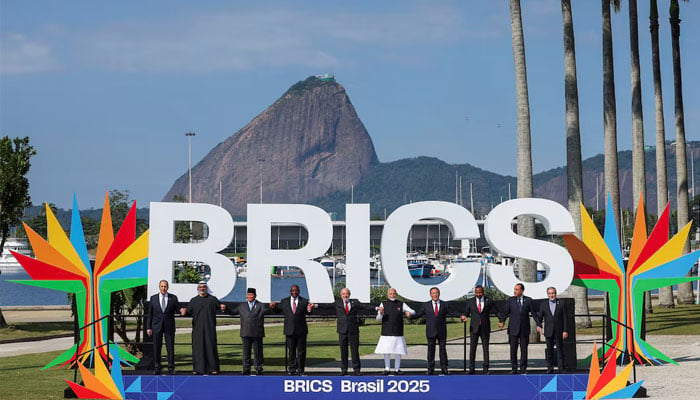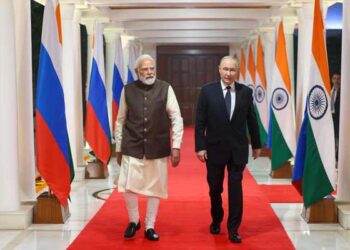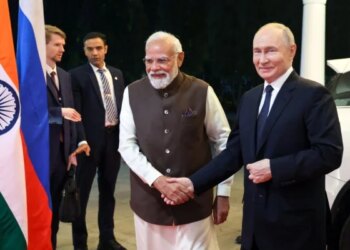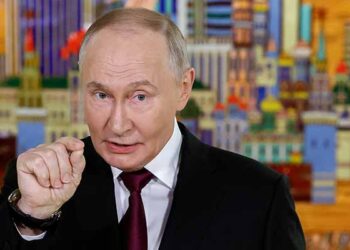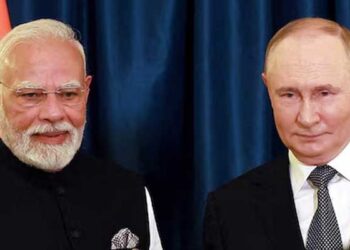Select Language:
- Lula compares BRICS to the Cold War’s Non-Aligned Movement.
- The group denounces attacks on Iran, Gaza, and rising tariffs.
- Xi Jinping does not attend, while Putin joins virtually; Modi and Ramaphosa are present.
During their summit on Sunday, BRICS leaders expressed condemnation of assaults on Iran, Gaza, and Kashmir, positioning the bloc as a champion of multilateral diplomacy and implicitly challenging U.S. military and trade strategies.
Faced with division in platforms like the G7 and G20 and the disruptive “America First” agenda under President Donald Trump, the expansion of BRICS has created new avenues for diplomatic collaboration.
In his opening address at the Rio de Janeiro gathering, Brazilian President Luiz Inacio Lula da Silva drew a connection to the Non-Aligned Movement of the Cold War, which comprised nations that sought to remain neutral amid a polarized global landscape.
“BRICS is the successor of the Non-Aligned Movement,” Lula asserted. “As multilateralism faces challenges, our independence is once again in jeopardy.”
He highlighted that BRICS nations now account for over half of the world’s population and about 40% of the global economy, cautioning business leaders on Saturday about the threat posed by increasing protectionism.
The original BRICS group was formed in 2009, bringing together Brazil, Russia, India, and China. Over the years, South Africa joined, followed by Egypt, Ethiopia, Indonesia, Iran, Saudi Arabia, and the United Arab Emirates, making this the first summit to include Indonesia among its leaders.
A diplomat from Brazil, who preferred to remain unnamed, noted, “The gap left by others is quickly filled by BRICS.” They acknowledged the considerable influence of the G7 but remarked that “it no longer holds the same level of power as before.”
Concerns persist regarding the common goals of the increasingly diverse BRICS group, which now includes regional competitors and emerging economies.
Chinese President Xi Jinping opted to send his prime minister in his absence, while Russian President Vladimir Putin participated online due to an arrest warrant from the International Criminal Court.
Nonetheless, several leaders were present for discussions at the Museum of Modern Art in Rio over Sunday and Monday, including Indian Prime Minister Narendra Modi and South African President Cyril Ramaphosa.
Interest in joining BRICS has surged, with over 30 countries expressing a desire to become either full members or partners.
Increasing Influence and Complexity
The expanding membership of BRICS has enhanced its diplomatic significance, allowing it to represent the interests of developing nations throughout the Global South and advocating for reform of global institutions like the United Nations Security Council and the International Monetary Fund.
“If global governance does not reflect the new multipolar reality we face in the 21st century, it falls upon BRICS to help modernize it,” Lula stated, underscoring the failures of U.S.-led military interventions in the Middle East.
In a joint statement issued on Sunday, the leaders denounced attacks on Iran’s “civilian infrastructure and peaceful nuclear facilities, which are safeguarded by the International Atomic Energy Agency.”
The group expressed “deep concern” for the Palestinian people amid Israeli assaults on Gaza and condemned what they termed a “terrorist attack” in Indian-administered Kashmir.
On economic matters, the joint statement warned that the “widespread increase in tariffs” poses a threat to global trade, subtly criticizing Trump’s tariff policies.
They also extended their support for Ethiopia and Iran to formally join the World Trade Organization and called for a prompt restoration of the organization’s ability to address trade disputes.
Furthermore, plans were endorsed for a BRICS Multilateral Guarantees initiative within the New Development Bank, aimed at reducing financing costs and enhancing investments in member countries, as first reported by Reuters last week.
Brazil, which is also hosting the United Nations climate summit in November, is utilizing these gatherings to showcase the serious commitment developing nations have to climate change, especially in light of the U.S. scaling back its climate initiatives under Trump.
Chinese and UAE officials indicated during discussions with Brazilian Finance Minister Fernando Haddad in Rio that they plan to invest in a new Tropical Forests Forever Facility, according to sources familiar with the funding discussions aimed at conserving endangered forests worldwide.

